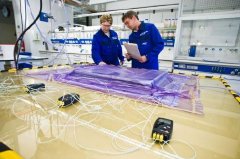BASF has expanded its application lab for epoxy resin systems at the Ludwigshafen site in which the company develops new systems and adapts their processing parameters to the specific processes of its customers. BASF markets the systems - which are used in particular for the production of high-performance wind turbine rotor blades made from fiber-reinforced composites - under the brand name Baxxodur.
 BASF expands epoxy resin systems lab.
BASF expands epoxy resin systems lab.
The new laboratory offers a wide range of facilities for determining product-specific parameters for processing these systems. For example, a modulated differential scanning calorimetry (MDSC) device is available to determine the cross-link density and the glass transition temperature of these systems. A sophisticated oscillating rheometer allows engineers to appraise the processing and flow behavior the epoxy systems will show in the production of fiber-reinforced composites. This rheometer covers a much greater measuring range than conventional equipment.
The laboratory expands BASF's capability to study the production of components made from fiber-reinforced epoxy resins under real-life conditions. Large-scale heating tables, infusion and injection units are now available to simulate a variety of processing conditions at customer facilities. The parameters determined in this way provide the basis for BASF's recommendations for product usage and are customized to match the component being manufactured and the customer's specific process conditions.
The test specimens the laboratory makes from the epoxy resin systems can be subjected to additional testing in other BASF facilities in Ludwigshafen. These facilities have been approved by Germanischer Lloyd AG (GL), one of the world's leading certification bodies for wind energy plants.
BASF will use the new lab and its testing facilities to expand its service offering in this business area. Based on the data generated in these facilities, the company's global team of application engineers will join forces with its customers by providing on-site support during the introduction of epoxy systems and the ongoing production process.
Composites based on thermosetting epoxy resin systems have become an established material for the production of modern wind turbine rotor blades. BASF supplies GL approved systems that help to speed up the rotor production process significantly. As a result, rotor blade manufacturers will be able to reduce their process times by up to 30 percent, boosting their production efficiency. Production process also become more flexible because BASF's systems can be processed over a wider temperature range than conventional products.